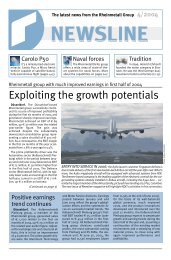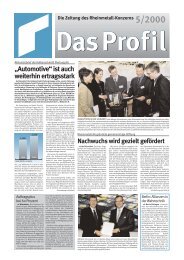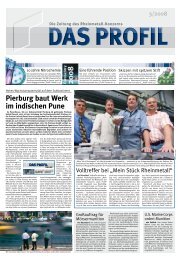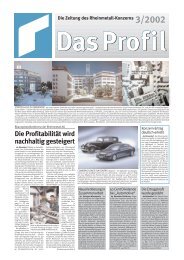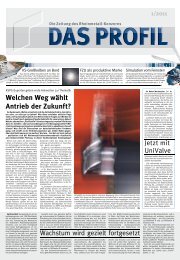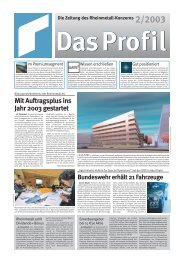PDF [2.1 MB] - KSPG AG
PDF [2.1 MB] - KSPG AG
PDF [2.1 MB] - KSPG AG
Create successful ePaper yourself
Turn your PDF publications into a flip-book with our unique Google optimized e-Paper software.
tarting 2007, the European<br />
Commission plans<br />
to invest considerable<br />
funds in a research and<br />
technology development<br />
program to improve security<br />
in Europe. The manner<br />
in which the European Security Research<br />
Program (ESRP) will ultimately<br />
be implemented and the exact amount<br />
of research funds available are as yet<br />
unclear. The experience gained in the<br />
course of the so-called Preparatory Action<br />
launched at the beginning of 2004<br />
will be taken into account for the actual<br />
performance of the program. The European<br />
agency in the field of defence capabilities,<br />
development, research, acquisition<br />
and armaments – this agency<br />
is still to be created – will also play an<br />
important role in this context. Rheinmetall<br />
DeTec <strong>AG</strong> has been following developments<br />
very closely and is represented<br />
in various of the working groups<br />
involved in the Preparatory Action.<br />
The European Commission has initiated<br />
the planned security program in<br />
reaction to the challenges associated<br />
with the EU’s eastern enlargement and<br />
the changed security situation in re-<br />
cent years, leading to the further development<br />
of EU common foreign and security<br />
policy toward a European security<br />
and defence policy.<br />
Generally speaking, the Commission<br />
believes that not enough money is being<br />
spent on research and development<br />
in Europe, and that the limited<br />
funds are not being used optimally, especially<br />
where security aspects are<br />
concerned. For instance, various EU<br />
member states are working on the<br />
same subjects independently of one<br />
another since each of these countries<br />
wants to have a good standing in as<br />
many areas as possible. This means<br />
that inadequate funds are available for<br />
the individual areas. Such a lack of coordination<br />
has a negative impact on<br />
the competitiveness of the industry.<br />
In view of the increasingly serious<br />
threats posed by international terrorism,<br />
the propagation of weapons of<br />
mass destruction, and organized crime<br />
that is partly assisted by weaker states,<br />
it has become more and more difficult<br />
to assure the security of European citizens.<br />
The recent enlargement of the EU<br />
by another ten states (Estonia, Latvia,<br />
Lithuania, Poland, Hungary, Czech Republic,<br />
Slovakia, Slovenia, Malta and<br />
Newsline<br />
Cyprus) has also brought EU borders<br />
geographically closer to areas of conflict.<br />
As a community with (now) 25<br />
member states and a total population<br />
of 455 million producing around one<br />
quarter of the world’s gross national<br />
product, the European Union has – economically<br />
– developed into a global<br />
player. The EU must therefore be able<br />
and willing to contribute toward international<br />
security. This also implies that<br />
it must help toward greater security and<br />
stability jointly with partners outside<br />
the European territory, if necessary also<br />
supported by its armed forces.<br />
The question as to whether Europe<br />
will be able to master this challenge also<br />
depends on the availability of a competitive<br />
European technology base. To<br />
maintain and expand this, coordinated<br />
research and adequate funding are essential.<br />
Although the EU has gained extensive<br />
experience in civil community<br />
research programs with its so-called<br />
Framework Programs, it is breaking new<br />
ground with its ESRP initiative. The collaboration<br />
between companies in the<br />
security sector raises new questions<br />
which remain to be answered. These<br />
concern the way in which information<br />
classified as confidential or secret is<br />
handled, national priorities and interests<br />
and also technical, contractual and<br />
implementation aspects.<br />
To answer these questions, the<br />
Preparatory Action for the Enhancement<br />
of European Industrial Potential<br />
in the Field of Security Research was<br />
launched at the beginning of this year.<br />
This action program seeks to establish<br />
the conceptual bases for the ESRP by<br />
the year 2006. It is also hoped that first<br />
results for top-priority problems may<br />
already be reached with a limited number<br />
of (test) projects. All in all, around<br />
€ 65 million have been allocated to the<br />
Preparatory Action program.<br />
The European defence industry has<br />
shown strong interest in the security<br />
research, and also in the Preparatory<br />
Action initiative although only limited<br />
funds are available for this (in 2004,<br />
approx. € 15 million). It is generally assumed<br />
that the national research and<br />
technology budgets (in Germany, the<br />
research and technology budget of the<br />
German MoD) will become less important<br />
with the advent of the ESRP. Companies<br />
are therefore using the Preparatory<br />
Action to get prepared for the allocation<br />
of research funds from Brussels.<br />
6<br />
Rheinmetall DeTec <strong>AG</strong> has been following<br />
related developments closely<br />
since early 2003. One focus has been<br />
the involvement in national and European<br />
industrial associations. Rheinmetall<br />
DeTec employees are helping to<br />
shape the security program through<br />
their participation in several security<br />
research working groups.<br />
The Preparatory Action aims to address<br />
these missions:<br />
1. Achieving interoperability and integrated<br />
systems for information and<br />
communication<br />
2. Optimizing security and protection<br />
of networked systems<br />
3. Improving situation awareness<br />
4. Protection against terrorism (including<br />
bio-terrorism and incidents<br />
with biological, chemical and other<br />
substances)<br />
5. Enhancing crisis management (including<br />
evacuation, search and rescue<br />
measures, active agents control and remediation)<br />
A so-called Security Mission Industry<br />
Group (SMIG) has been created for<br />
each of these missions. These working<br />
groups are composed of experts from<br />
EU launches security research<br />
companies interested in performing<br />
projects in the respective area. The<br />
SMIG teams are tasked with bundling<br />
the interests of the industry, agreeing<br />
on two to three concrete projects and<br />
setting priorities. The SMIG groups also<br />
provide appropriate platforms for forging<br />
partnerships for project work.<br />
Representatives of Rheinmetall Defence<br />
are members of SMIG 3 and SMIG<br />
4, which address the mentioned priority<br />
missions concerning the improvement<br />
of situation awareness and the protection<br />
against terrorism. The leaders of<br />
the working groups report to the socalled<br />
Industry<br />
Working Group on<br />
Security (IWGS) in<br />
which the Düsseldorf-based<br />
group<br />
also has a representative.<br />
Calls for<br />
project proposals<br />
to be dealt with under<br />
the Preparatory<br />
Action program are<br />
published in the<br />
Dr. Joachim Bremer<br />
Official Journal of the European Commission.<br />
Dr. Joachim Bremer*<br />
* Dr. Joachim Bremer, the author of this Newsline article,<br />
specializes in strategic technology development at<br />
Rheinmetall DeTec <strong>AG</strong> in Düsseldorf.


![PDF [2.1 MB] - KSPG AG](https://img.yumpu.com/4218313/6/500x640/pdf-21-mb-kspg-ag.jpg)
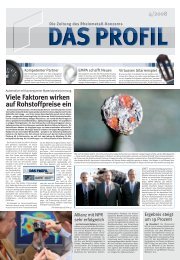
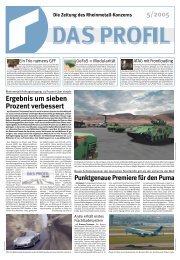
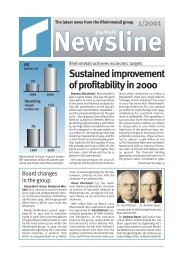

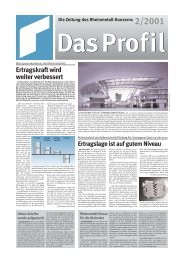
![PDF [1.0 MB] - KSPG AG](https://img.yumpu.com/5513074/1/171x260/pdf-10-mb-kspg-ag.jpg?quality=85)

